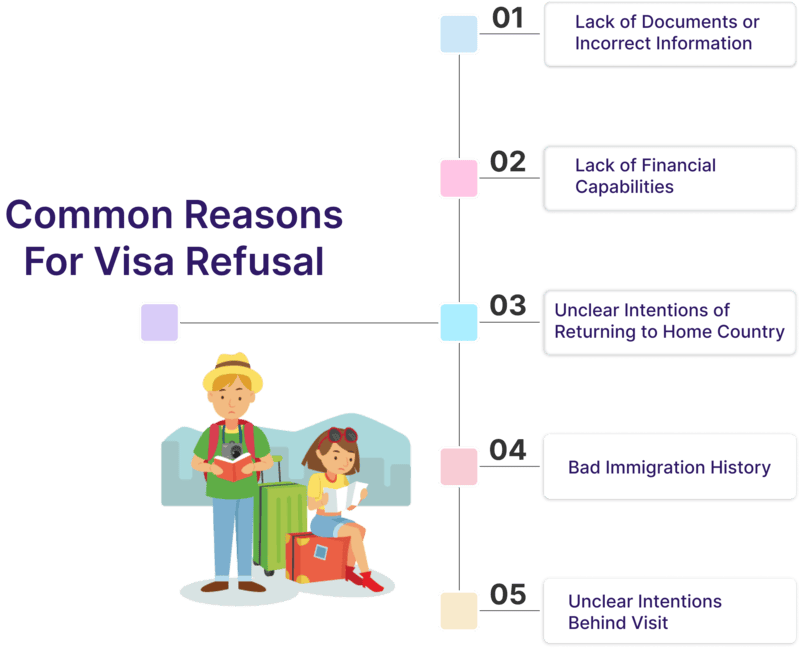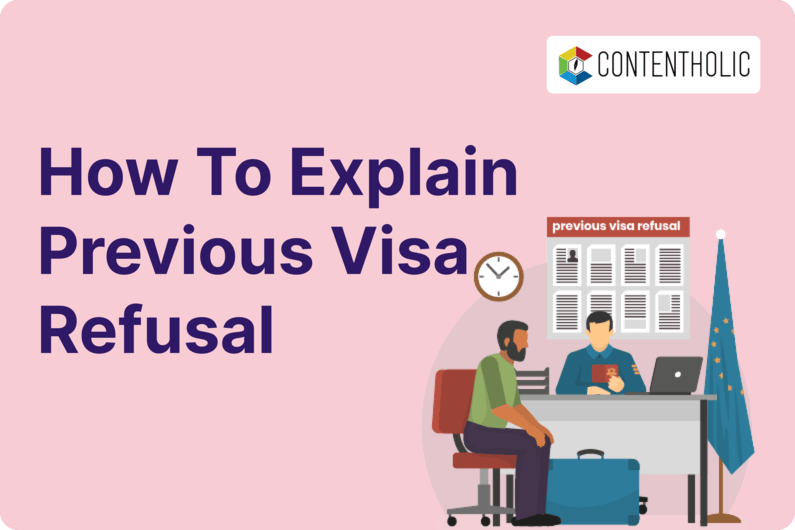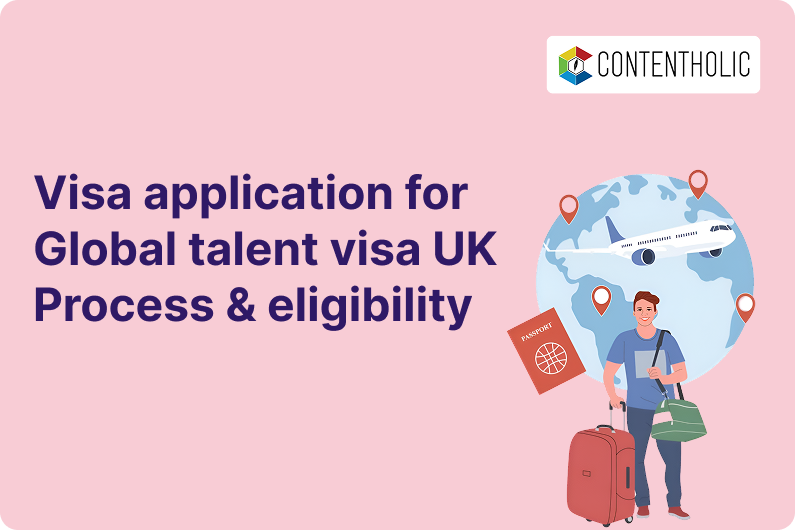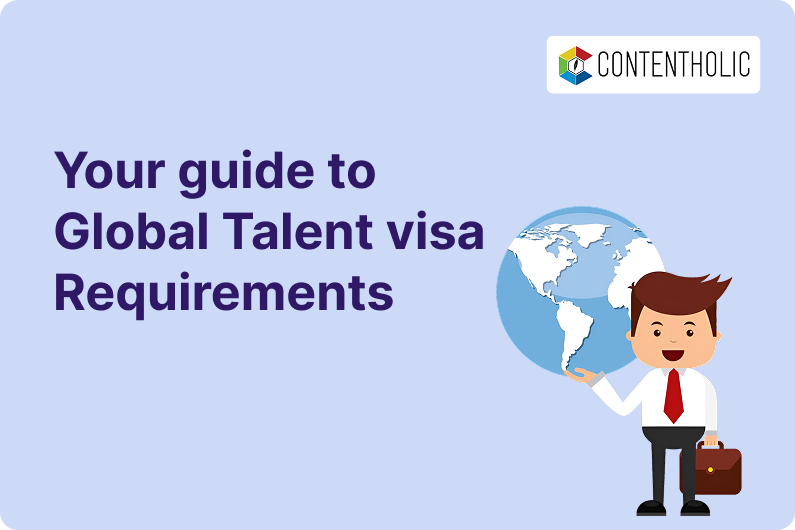Getting your visa accepted is indeed a joyful moment for the applicant. However, what if we inform you that visa application refusals are equally common? If you are someone who has faced a refusal, we very well understand how disappointing it can be. Whether you are applying for a student visa, work visa, tourist visa, or any other reason, a refusal can shatter your desires and plans. A visa refusal is a sign that the embassy/consulate of the country you applied to found you unworthy of entering their country due to some reasons. The motives behind this refusal can vary and usually mean that your application was missing in some areas. However, do not get disheartened, you could always turn your refusal into a wonderful outcome. For this, it is essential to understand why visa applications get rejected and the way to conquer them on your succeeding application.
In this blog, we will understand why applicants receive visa refusals, the common grounds behind these refusals, how can they be rectified, and why Contentholic is the best visa consultancy that will help you conquer these hurdles.
Common Reasons for Visa Refusal
The visa application can be refused for various reasons, from incomplete documents or the lack of clear intention behind going to a country. Under this, we have listed the reasons why most visa applications get rejected. We have additionally tried to guide you through how these errors may be rectified, and the most effective solution is to craft a well-defined Letter of Explanation (LOE) after refusal. An LOE can be a crucial factor in getting visa approval.

1. Lack of Documents or Incorrect Information
Often it happens that applicants do not read the visa requirements properly or mention some information but do not back them with the appropriate documents. So one of the most common mistakes is incomplete or incorrect documents. If the embassy or the consulate finds that your submitted documents are missing some key information or have discrepancies, it is guaranteed that your application will be rejected.
How to Rectify: Read the guidelines or instructions of a visa application carefully, ensuring that you are submitting all the documents with the correct information. Go over the application form one to two times to check certain essential information such as financial statements, university admission letters, or any other paperwork. A letter of explanation is the most effective solution to explain the lack of documents or why some documents were not provided with the previous application. In the letter, you need to clarify to the visa officer the previous inconsistencies and assure them that the new application has all the necessary documents. In your SOP after refusal, refer to your previous mistake and how you have corrected it, making your application more authentic.
2. Lack of Financial Capabilities
Another common mistake is a lack of proper explanation about the proof of funds. The visa officer needs to be convinced that you can sustain yourself throughout your stay and would be a liability to that country.
How to Rectify: To convince you about your financial stability, you need to provide all the updated financial documents. These will include all those financial resources that would or could help you stay comfortably in a foreign land, such as your bank statements, your sponsor’s bank statements, affidavits of support, letter of scholarship, Chartered Accountant (CA) statement about your or your family’s movable and immovable assets, savings, or fixed deposits. In your letter of explanation after refusal, explain your economic situation in more detail, especially if your previous application was rejected on this ground. It can be the case that your financial situation might have improved since your previous application, then you need to explain what factors led to the improvement and now how you are going to fund your stay. The whole purpose of an SOP after visa refusal is to reassure the visa officer that you can support your studies or stay in their country, and include any additional information such as sponsors who are going to support you financially.
3. Unclear Intentions of Returning to Home Country
Visa applications get rejected when applicants do not strongly imply their intention of returning to their home country after the mentioned duration of stay. It might happen when you mention any plans in that country after the said duration or do not clearly state what ties you have in your homeland which is going to force you to return. Visa refusal for this reason is most common in student visas and work visas.
How to Rectify: The first thing you need to think about is that what are reasons you would need to return home. The reasons could be to support your family, especially old parents, offers of employment which you have already received after completing your studies in case you are going on a student visa, or your current job which has approved your leave for a definite period, properties or businesses you have to take care off upon return, or the best evidence–a return ticket if you are going for a short visit, helpful in the case of tourist visa. In the letter of explanation after refusal, clarify and assure how your professional commitments or personal circumstances will force you to come back home after your visa expires. In your letter, it would be beneficial if you could explain your plans in your home country, and how this travel to abroad is just a small step towards fulfilling your personal, academic, or professional goals, not a long-term plan.
4. Bad Immigration History
If you have a record of previous issues concerning overstaying in a country after the visa expires, not following the immigration rules and regulations, or having issues with the terms of a visa, this could be a strong case against you. Another reason could be if you have been denied entry or faced deportation from another country.
How to Rectify: You have to be 100% honest in this matter. Explain the circumstances behind the mistakes you made in the past, and what you learned from them. In your SOP after visa refusal, include details about your previous travel history, and what led to the issues, and make sure to mention how they were resolved. Assure the officer that you have acknowledged your previous mistake and will adhere to all the rules and regulations by taking the necessary steps to avoid any visa violations in the future.
5. Unclear Intentions Behind Visit
This is the most important purpose behind writing an SOP, to convince the visa officer about your purpose of visit. If you fail to convince your purpose, there is a high chance of your visa getting rejected. Applicants often write about vague plans while being in the country, give contradictory statements or their reasons for going to the country seem inconsistent. This happens when a clear set of roadmap is not made by the applicants after stepping into that country.
How to Rectify: It is important to be clear about your visit and precise with your information. Clearly state, whether you are going for studies, to work, for tourism purposes, or to visit some family members or friends. Provide a detailed explanation about how you came about this decision to go to that country and outline your purpose step-by-step. It would be more convincing if you could state how this visit to that country will help you fulfill your goals, be it to explore the country, study in one of their universities, or gain some work experience for a few years. A convincing SOP after visa refusal should demonstrate your goals, and explain why you have chosen a particular program/university or the country for your further studies, or why accepted a particular job, and how these decisions fit in your long-term goals. If in your previous application, there was some confusion regarding your purpose of visit, use the letter of explanation after refusal to clarify the said confusion and enclose additional documents such as your admission letter or the job offer letter.
How Professional Help Can Be Used for Visa Filling and SOP Writing?
It is completely possible to write a letter of explanation after visa refusal on your own by researching and understanding how to write one. However many applicants still find it difficult with regards to justify or clarify the grounds on which their previous application was rejected. If you are one such candidate you can take benefits of the professional visa consultancy services. Here is why you should consider seeking professional help:
- Visa consultancy services, especially those offered by Contentholic, have the needed experience as well as expertise in guiding how to clarify the issues that were raised by the visa officer. Contentholic’s experienced SOP writers in India will ensure that your application covers everything that needs to be stated and is convincing to successfully get a visa approval.
- Each applicant’s visa can be refused on different grounds. Therefore, professional SOP writers make sure that the letter of explanation after refusal is written in accordance with your specific situation, addressing the reasons your previous visa application was refused and strengthening the reapplication with valid justifications.
Conclusion
A visa refusal may be discouraging, but it is not the end of your dreams. Through carefully addressing the reasons for refusal and writing a well-crafted letter of explanation, you may substantially increase your probability of approval with your next application. By seeking help from expert SOP writers and trusted visa consultancy services like Contentholic, you can make effective changes to secure a visa. Do not allow a refusal to stop you from accomplishing your dreams. Take the right steps with the help of Contenholic to rectify your application and reapply with confidence.
On the subject of visa refusals, Contentholic’s name comes within the first-rate visa consultancy services and SOP writing services in India. With over a decade of experience, Contentholic has helped heaps of applicants turn their visa refusals into successful visa approvals. Their complete services are not restricted to writing an SOP after a visa refusal but extend to supporting you through the documentation process visa interview guidance, and assisting you all through the visa application procedure.






